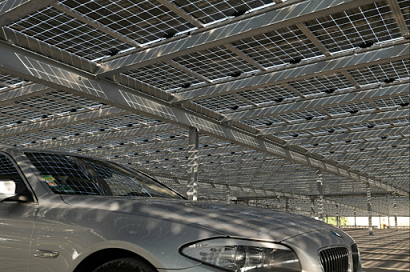
Only approved construction materials can be installed in Germany, as in the UK. Generally a CE-sign on a product establishes the suitability of a product for a certain use or operation, for example a certified PV-module has a CE-mark according the Low Voltage Directive (2014/35/EU), which shows it is safe, electrically.
To use a PV module as overhead glazing, one must consider the glazing standards – and only a glass with safety glass properties may be installed. The main features of safety glass are (a) in case of breakage, all broken glass is held by the plastic film and (b) the ‘interlayer’ is able to support the module for a certain time, providing the opportunity to repair the defect and make safe the area below, removing the broken glass.
These safety glass approvals are not granted by the Low Voltage Directive and have to proven separately, mainly because the PV modules is different from normal safety glass in two ways: the interlayer is EVA instead PVB and the solar cells are not considered the norm in laminated glass.
These safety glass properties have now been certified in Germany with an abZ (allgemeine bauaufsichtliche Zulassung / national technical approval). To achieve this, tests have to be done to show that the PV module is equal to a safety glass. The tests are for example durability against moisture and temperature, residual capacity, shock resistance and manufacturing quality. Finally an expert opinion about these results is necessary. All documents are checked by the DIBt and issues the abZ. This is the optimal way to make this module available to the market.
There are two other ways to install a PV module as overhead glazing. First, mount a strong net underneath the modules to ensure that nobody gets hurt under the module in case of damage – not very aesthetic and you have extra mounting costs, and the second is the Zustimmung im Einzelfall (ZiE, approval in individual cases). Here also, the safety glass properties have to be proven, but individually for every project. This means all tests and document have to be done for every project. This effects the timetable and budget plan of every project enormously.
This means that abZ certification is the most efficient certification for all parties. The award of the certification by the German Institute for Structural Engineering (DIBt) to the Vision 60M construct means that time and money will be saved that might otherwise have been spent on additional safety measures or obtaining specific permits. It will also provide further quality and safety assurance to owners and occupants in Europe and internationally, and to professionals such as engineers, architects, builders, surveyors and planners.
“In 2014 we were the first manufacturer to receive an abZ for a photovoltaic module – at that time for a veranda and carport module with 36 cells” said Detlef Neuhaus, Solarwatt Managing Director. “The abZ for the 60-cell module gives us access to completely new areas of application, such as industrial roofs and carpark roofs. In a few weeks we have received over 500 inquiries from architects about this product. This shows we have created an impact with our building-integrated photovoltaics offer.”
Vision 60M construct is ideally suited to overhead installation such as in multi-storey car parks, petrol stations, carports and veranda roofs. Installation can proceed without additional safety measures prescribed for other modules, such as steel netting. If appropriate, the glass-glass modules can completely replace roof cladding, massively reducing costs and building materials used in installation. Further, due to its approximately 10 percent transparency, the module provides shading without complete darkness.
“This not only saves project developers and installers time and money, but also improves aesthetic appearance” Mr Neuhaus added.
Bavarian premium automotive supplier Dräxlmaier has built a parking garage roof using Vision 60M construct, covering a previously open parking deck with 4,200 modules in summer this year. The visually stunning 1.28MW system on the company’s premises in Vilsbiburg is the largest PV system employing glass-glass technology in Germany. According to Mr Neuhaus, the company will also use the electricity it generates itself, saving around 560 tons of CO2 per year, and, on completion, it will have 350 environmentally friendly EV charging points on its premises.
For additional information:

